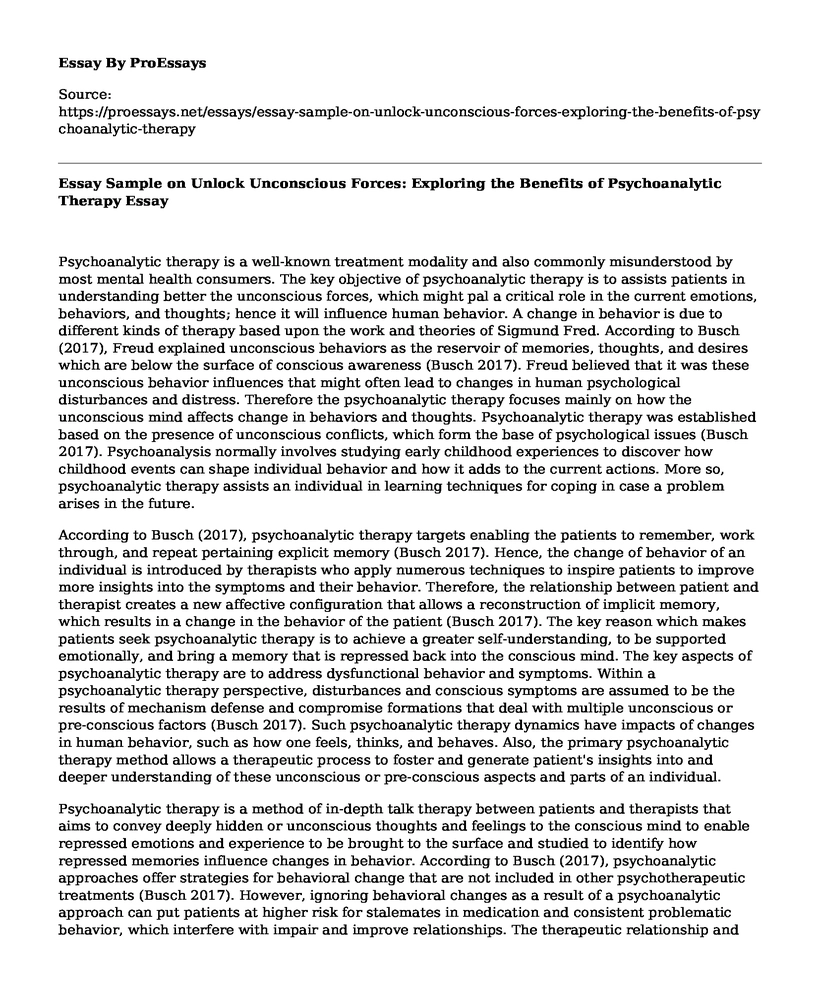Psychoanalytic therapy is a well-known treatment modality and also commonly misunderstood by most mental health consumers. The key objective of psychoanalytic therapy is to assists patients in understanding better the unconscious forces, which might pal a critical role in the current emotions, behaviors, and thoughts; hence it will influence human behavior. A change in behavior is due to different kinds of therapy based upon the work and theories of Sigmund Fred. According to Busch (2017), Freud explained unconscious behaviors as the reservoir of memories, thoughts, and desires which are below the surface of conscious awareness (Busch 2017). Freud believed that it was these unconscious behavior influences that might often lead to changes in human psychological disturbances and distress. Therefore the psychoanalytic therapy focuses mainly on how the unconscious mind affects change in behaviors and thoughts. Psychoanalytic therapy was established based on the presence of unconscious conflicts, which form the base of psychological issues (Busch 2017). Psychoanalysis normally involves studying early childhood experiences to discover how childhood events can shape individual behavior and how it adds to the current actions. More so, psychoanalytic therapy assists an individual in learning techniques for coping in case a problem arises in the future.
According to Busch (2017), psychoanalytic therapy targets enabling the patients to remember, work through, and repeat pertaining explicit memory (Busch 2017). Hence, the change of behavior of an individual is introduced by therapists who apply numerous techniques to inspire patients to improve more insights into the symptoms and their behavior. Therefore, the relationship between patient and therapist creates a new affective configuration that allows a reconstruction of implicit memory, which results in a change in the behavior of the patient (Busch 2017). The key reason which makes patients seek psychoanalytic therapy is to achieve a greater self-understanding, to be supported emotionally, and bring a memory that is repressed back into the conscious mind. The key aspects of psychoanalytic therapy are to address dysfunctional behavior and symptoms. Within a psychoanalytic therapy perspective, disturbances and conscious symptoms are assumed to be the results of mechanism defense and compromise formations that deal with multiple unconscious or pre-conscious factors (Busch 2017). Such psychoanalytic therapy dynamics have impacts of changes in human behavior, such as how one feels, thinks, and behaves. Also, the primary psychoanalytic therapy method allows a therapeutic process to foster and generate patient's insights into and deeper understanding of these unconscious or pre-conscious aspects and parts of an individual.
Psychoanalytic therapy is a method of in-depth talk therapy between patients and therapists that aims to convey deeply hidden or unconscious thoughts and feelings to the conscious mind to enable repressed emotions and experience to be brought to the surface and studied to identify how repressed memories influence changes in behavior. According to Busch (2017), psychoanalytic approaches offer strategies for behavioral change that are not included in other psychotherapeutic treatments (Busch 2017). However, ignoring behavioral changes as a result of a psychoanalytic approach can put patients at higher risk for stalemates in medication and consistent problematic behavior, which interfere with impair and improve relationships. The therapeutic relationship and gaining insights into psychoanalytic therapy should be emphasized mainly instead of aiming for the treatment in behavioral change. According to Busch (2017), the psychoanalytic approach causes changes in the behavior of patients through advancement in health status, advanced emotional support, quality life, an advanced sense of well-being (Busch 2017).
Reference
Busch, F. N. (2017). Promoting behavioral change in psychoanalytic treatments. Psychodynamic psychiatry, 45(1), 79-102.https://guilfordjournals.com/doi/abs/10.1521/pdps.2017.45.1.79
Cite this page
Essay Sample on Unlock Unconscious Forces: Exploring the Benefits of Psychoanalytic Therapy. (2023, May 07). Retrieved from https://proessays.net/essays/essay-sample-on-unlock-unconscious-forces-exploring-the-benefits-of-psychoanalytic-therapy
If you are the original author of this essay and no longer wish to have it published on the ProEssays website, please click below to request its removal:
- Meditation and Consciousness Research Paper
- Aging Effects and Personality Essay
- Is It Morally Permissible for Physicians to Assist in a Suicide? Essay
- Essay Sample on Personal Behavioral Health Change
- Impacts of Trauma Paper Example
- Essay Sample on Adolescents: Mental Health Issues and Self-Harm Risk
- Three Friends and a Fight: Friendship Put to the Test - Essay Sample







